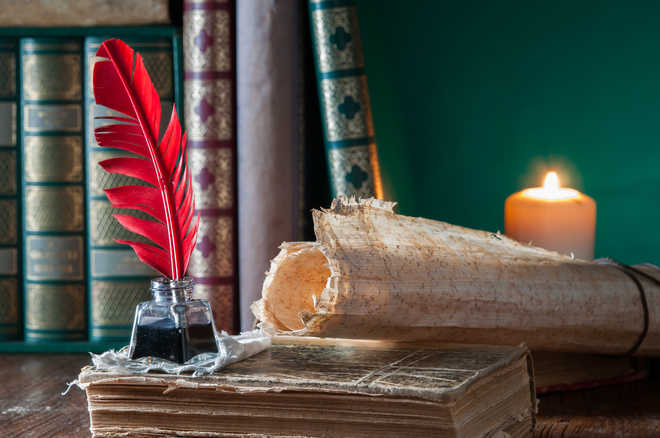Mukul Bansal
Sometimes grace descends on you in an unexpected manner. I had grown up on Urdu poetry from a young age, courtesy my father, who is no more. He was a distinguished scholar of Urdu poetry. Understanding my interest in Urdu poetry, he used to recite it to me in his poetic moods or on my asking, even up to 2 am.
He was my eyes and ears to Urdu poetry because I didn't know the Urdu script — didn't go beyond “alif, be, pe, te...” — and meanings of difficult Urdu words, so he was my interpreter too.
His repertoire of Urdu poetry was vast. He had in his possession more than a dozen select issues of the famous Pakistani periodical on Urdu poetry, Savera. His friends who would go to Pakistan would return with issues of the periodical to gift these to him.
What happens generally is that aficionados of Urdu poetry know and read prominent Urdu poets like Bedil, Mir Taqi Mir, Ghalib, Zauq, Josh Malihabadi and among the moderns Faiz Ahmed Faiz, Ahmed Faraz, Nasir Kazmi, Munir Niazi, Habib Jalib, Zia Jalandhari, Ahmad Naseem Qasmi and Iftikhar Arif, etc. But my father used to discover unknown great poets like Shohrat Bukhari, Shahzad and many others, based on his poetic sensibility, insight into Urdu poetry and keen perception.
While listening to the relatively unknown greats of Urdu poetry, I’d consider that to be my real reward. For instance, three of my favourite shers from a ghazal penned by Bukhari are: “Doobti nao (boat) ka nazara kya, charte dariya ko dekhta koi/Apni hi surat se khauf khata hoon, yun dikhata hai aaina koi/Raat bhar aasman ko taqta hoon, jaise taron mein ja basa koi.”
My father was in his element while reciting to me Faiz, Faraz and Munir Niazi, besides a few other poets — for instance, Urdu poetry by Iftikhar Arif. He would say Faiz wrote his revolutionary and love poetry with a fervour and sensitivity that bespoke of a baadshah-like temperament and disposition.
A sher by Faiz comes to my mind of that temper: “Jo hampe guzri, so guzri, magar aye shab-e-hijran, hamare ashq teri akebat sanwaar chale” (Whatever I went through on the night of separation from you, my tears ended up embellishing your future).
I don’t know the reason, but often a great poet’s best poems may not be so well known. Long time ago, I came across a nazm by Faraz that I have heard from no one else. I don’t know the title of the poem, but it is rich in content: “Zindagi ki ab nayi rasmein bana dee jayengi, jism dhay jayenge deewarein bana dee jayengi/Ab makanon mein makeen (inhabitants) honge na awazon ke phool, sirf deewaron pe tasveerein laga di jayengee...” If you read it in full, it portrays a scenario of a future stricken by a nuclear holocaust, one possible interpretation.
Some of Faraz’s memorable poetry I heard in a mushaira, which was telecast also, had these gems: “Shiddate tishnagi (intense thirst) mein bhi, gairate-myakashi rahi (self-respect while drinking), Usne jo pher li nazar, maine bhi jaam rakh diya/Usne nazar-nazar mein hi aise bhale sukhan (batein) kahe, maine to uske paon mein saara qalam (whatever I had to recite) rakh diya.”
Another gem by Faraz recited in this mushaira comes to my mind: “Dukh fasana (story) nahin ki tujhse kahein, dil bhi maana nahin ki tujhse kahein/Aai Khuda darde-e-dil hai bakhsheeshe dost (benevolence of my friend), ab-o-daana (water and food or means of subsistence) nahi ki tujhse kahein.”
Javed Akhtar says had Iftikhar Arif written no more Urdu poetry, this one sher written by him would have secured his place in the annals of Urdu poetry: “Aye Khuda mujhe itna to motbar (credible) kar de, mein jis makan mein rehta hoon, usko ghar kar de.” Another noteworthy sher of this nazm is: “Main apne khwaab se kat kar jeeyoon (giving up on one's dream) to aye mere Khuda, ujar de meri meeti, dar-badar (homeless) kar de.”
With apologies to Faiz and Faraz’s fans, after listening to a vast amount of Munir Niazi’s poetry, I concluded that there can be another Faiz or Faraz, but there cannot be another Niazi. Sample this: “Meri saari zindagi ko besamar (fruitless) usne kiya, umr meri thi, usko basar usne kiya.”
Niazi has written supernatural poetry par excellence in Urdu. The title of one of his books is “Jungle Mein Dhanak”. A verse from this book goes: “Subhe ... ki hava mein dard tha kitna Munir, rail ki seeti baji aur dil lahoo se bhar gaya.” Another instance of his vivid supernatural verses is: “Kal dekha ik admi, ata (covered) safar ki dhool mein, ghum tha apne-aap mein jaise khushboo phool mein.”
Poet Ahmed Wasi summed up the beauty of Urdu zubaan when he wrote: “Woh kare baat toh har lafz se khushboo aaye, Aisi boli wohi bole jise Urdu aaye.” Adieu!
Unlock Exclusive Insights with The Tribune Premium
Take your experience further with Premium access.
Thought-provoking Opinions, Expert Analysis, In-depth Insights and other Member Only Benefits
Already a Member? Sign In Now










